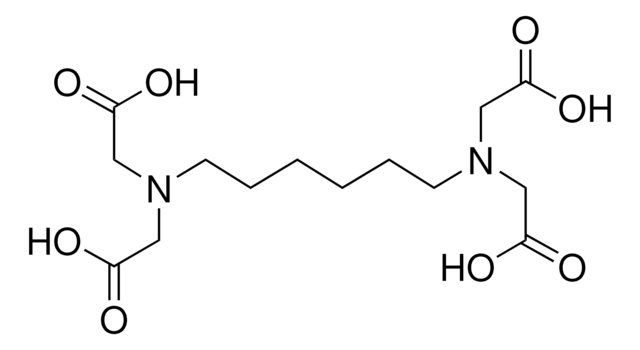84850
Sebacoyl chloride
purum, ≥95.0% (GC)
Synonyme(s) :
Sebacyl chloride
About This Item
Produits recommandés
Qualité
purum
Niveau de qualité
Pureté
≥95.0% (GC)
Forme
liquid
Indice de réfraction
n20/D 1.468 (lit.)
n20/D 1.468
Point d'ébullition
168 °C/12 mmHg (lit.)
Pf
−5-−3 °C (lit.)
Densité
1.119 g/mL at 20 °C
1.121 g/mL at 25 °C (lit.)
Chaîne SMILES
ClC(=O)CCCCCCCCC(Cl)=O
InChI
1S/C10H16Cl2O2/c11-9(13)7-5-3-1-2-4-6-8-10(12)14/h1-8H2
Clé InChI
WMPOZLHMGVKUEJ-UHFFFAOYSA-N
Vous recherchez des produits similaires ? Visite Guide de comparaison des produits
Description générale
Application
Mention d'avertissement
Danger
Mentions de danger
Conseils de prudence
Classification des risques
Acute Tox. 4 Oral - Eye Dam. 1 - Skin Corr. 1B - STOT SE 3
Organes cibles
Respiratory system
Code de la classe de stockage
8A - Combustible corrosive hazardous materials
Classe de danger pour l'eau (WGK)
WGK 3
Point d'éclair (°F)
235.4 °F - closed cup
Point d'éclair (°C)
113 °C - closed cup
Équipement de protection individuelle
Faceshields, Gloves, Goggles, type ABEK (EN14387) respirator filter
Faites votre choix parmi les versions les plus récentes :
Déjà en possession de ce produit ?
Retrouvez la documentation relative aux produits que vous avez récemment achetés dans la Bibliothèque de documents.
Les clients ont également consulté
Notre équipe de scientifiques dispose d'une expérience dans tous les secteurs de la recherche, notamment en sciences de la vie, science des matériaux, synthèse chimique, chromatographie, analyse et dans de nombreux autres domaines..
Contacter notre Service technique














